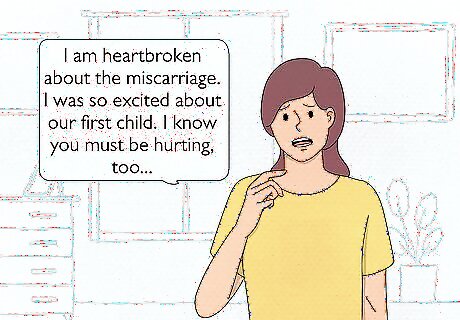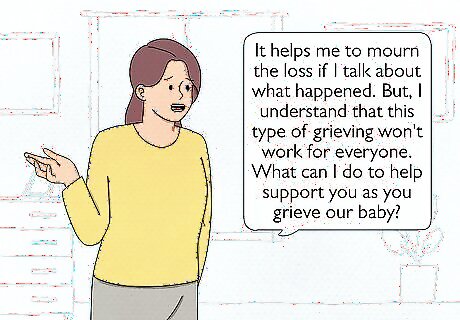
views
Communicating With Each Other

Identify what you are feeling. Before you talk with your husband about how you are feeling, make sure to take some time to think about how the miscarriage has affected you. Spend some time alone and reflect on your feeling. Try writing out how you feel before starting a discussion with your husband. For example, you might write about feeling sad, disappointed, angry, frightened, etc.

Talk about the loss with your husband. Miscarriage affects everyone differently. Your husband may be having a hard time coming to terms with what has happened, too. Sharing your feelings with each other may be painful, but it is a necessary step towards working through your grief. Grieving is often more effective when you voice your thoughts and feelings with someone who shares the loss. You might say to your husband, "I am heartbroken about the miscarriage. I was so excited about our first child. I know you must be hurting, too..." Recognizing that he suffered a loss, too, can open the door for honest conversation.

Consider your husband’s grieving style. Different people sometimes grieve differently. Your husband may channel his pain into taking care of practical things and trying to move on, rather than dwelling on the event and his emotions. Even if your husband is putting on a good face to the world, that doesn’t mean he isn’t sad, angry, or depressed inside. Think about other losses or setbacks your husband has experienced in your time together. How did he respond? Was it similar to how he is responding now? Ask your husband what he needs, and express your own needs, too. Say something to the effect of, "It helps me to mourn the loss if I talk about what happened. But, I understand that this type of grieving won't work for everyone. What can I do to help support you as you grieve our baby?"

Tell your husband what kind of emotional support you need. Your husband may not know how to comfort you, or he may be worried about saying the wrong thing. Instead of hoping he’ll know what to do and then feeling resentful when he doesn’t, ask him directly for what you need, whether that means a listening ear, a hug, or just some company. For instance, you might say to him, “Today has been a rough day for me. Can I talk to you about how I’m feeling?” Some people are more comfortable expressing their emotions non-verbally. Your husband might have a hard time talking about the miscarriage, but be eager to comfort you in other ways, such as holding you or taking care of things around the house. Look for ways in which he is trying to comfort you or make your life easier, and recognize him for those to strengthen your bond. For example, if you notice that your husband has been helping out more than usual with household chores, then this might

Ask your husband what kind of support he needs. Your husband might be acting brave in the face of the loss, but he needs support too. By taking the initiative to comfort him, you’ll make him feel more comfortable doing the same for you. Address his feelings when you talk about the miscarriage, and ask him what he needs from you. If your husband isn’t forthcoming about his feelings, make sure he knows you’ll be there for him in the future if he changes his mind. Say, “If you ever want to talk about this, just let me know.” Affectionate touch like hugs and back rubs can be a good way to communicate your love and support to your husband. You might think about a few ways that you could support him and pass them along for him to think about, making it clear that you mean no pressure.
Strengthening Your Bond

Give yourselves time to recover from the loss. Grief affects everyone differently, and there’s no set timeframe for when you should feel “okay.” Avoid putting pressure on yourself or your husband to recover sooner than you are ready. Be aware that your husband may recover faster than you, or vice versa. Don’t take it personally if he starts to feel better before you do – grieving is unique to each person. Also, keep in mind that sometimes grief is delayed. It might not set in until months after the miscarriage.

Spend time together. Ask your husband to go for a walk with you, help you with the grocery shopping, or just be present with you. Spending time with each other can strengthen your bond as a couple and help you support each other through the aftermath of a miscarriage. For example, you could watch a new series or read a new book together to give you something to preoccupy you, talk about, and connect over.

Resume sexual activities only when you are ready. After a miscarriage, you and your husband may have ambivalent or negative feelings about sex. Avoid rushing into physical intimacy again until you both are emotionally prepared. Have an examination to make sure sex is safe for you, and communicate with each other about your feelings and fears. Once you are both ready, sex can be a powerful way to bring you closer together. In the meantime, you can trade massages, have a candlelight dinner, or cuddle on the sofa while watching Netflix to maintain intimacy and affection in your marriage. Physical affection is one of the most effective ways to feel better due to the release of Oxytocin in the brain. Exchange long hugs and make genuine eye contact with each other.

Confront a husband who refuses to connect. Despite your attempts to establish intimacy with your husband after the miscarriage, he could push you away. Although this is hurtful, you should try your best not to take his withdrawal personally. Different people just grieve differently, and he may require more time. However, if your husband continues to push you away or even blame you for the loss, you should openly discuss it with him. Find a time when both of you are in pleasant moods, and maybe at a neutral location outside of the home to start this conversation so that it's not threatening. You might say something like, "I feel like you have grown distant from me since we lost the baby. Can we please talk about that?" Miscarriage can have a negative impact on your marriage if both partners are not willing to share their feelings. Consider marriage or grief counseling to discuss any unresolved guilt or blame in order to move forward.
Seeking Help from Other Sources

Practice good self-care. When you’re in the throes of negative emotions, it’s important to take good care of yourself, even if you don’t feel like it. Start by having a medical examination to make sure your body is recovering. Then work on eating well, getting enough sleep, and doing some light exercise. Activities that promote mindfulness, like meditation and yoga, may help you feel better as well.

Seek support from other women in your life. Many women have a firsthand or well-informed perspective on miscarriage. These women will be able to empathize with you and support you. Seek out the company of your mother, a sister, or a close female friend to share your feelings when it’s too hard to bear them alone. There are also online support groups, or sometimes you can find live support groups through your OBGYN or PCP's office. An estimated one in five pregnancies ends in miscarriage, so it’s likely that some of the women you know have been in your situation before.

See a therapist. If you’re having trouble coping with your emotions, or if you’re not feeling any better as time goes on, make an appointment with a therapist. Couples counseling is a good option if your husband is willing to accompany you. Couples counseling will teach you to manage your individual emotions and support each other better as you grieve.




















Comments
0 comment